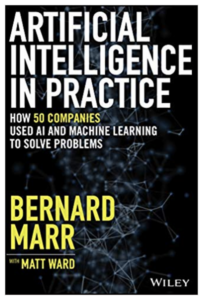“The rapidly evolving field of artificial intelligence has expanded beyond research labs and computer science departments and made its way into the mainstream business environment. Artificial intelligence and machine learning are cited as the most important modern business trends to drive success. It is used in areas ranging from banking and finance to social media and marketing. This technology continues to provide innovative solutions to businesses of all sizes, sectors and industries.” That is the backdrop against which Bernard Marr has published his latest book “Artificial Intelligence in Practice”. PlanetCompliance gives you a summary about what and what not to expect.
“One thing is very clear, artificial intelligence (AI) is going to change our world forever. And the change is likey to be more profound than most people realize today. No matter what job you are in, no matter what business or industry you work in. AI is going to augment, if not completely transform it.”
– Bernard Marr in the Introduction of ‘Artificial Intelligence in Practice’
Artificial Intelligence in Practice examines 50 use cases of companies that are applying AI to solve industry specific problems. In that sense it provides interesting insights how AI is used in real life as opposed to the more theoretical discussions focusing on its potential.
The fact that the examples exclusively focuses on large corporations also cements the progress AI has already made and the impact it has on our daily life. Examples range from the big tech companies Apple, Google, Facebook and alike to Retail, Consumer Goods and Food and Beverage Companies to Media, Entertainment and Telecom Companies to Services, Financial and Healthcare Companies to Manufacturing, Automotive, Aerospace and Industry 4.0 Companies.
Each case gives a brief overview of the company, discusses what problem AI is solving in the specific example, how it is used in practice, what technology, tools and data were used to do so, showcases the results and concludes with a summary on the key challenges, learning points and takeaways. Naturally, each case only presents a synopsis on each of these points, which is probably due to the format or the potential reluctance of companies wanting to share more than just their story of successful application of artificial intelligence.
This means that it leaves some readers with the unfulfilled desire to understand more about the actual tools the companies use and given this reluctance it is likely to be difficult to find more concrete information. As such the cases of smaller companies using more revolutionary approaches to the application of AI are possibly more satisfying to examine and a number of RegTech firms provide such examples.
Talking about regulatory technology and related fields, the examples are limited the case of American Express and how it uses AI to detect fraud and improve customer experience and Mastercard use of AI to cut down the ”False Declines”. Especially the case of American Express might be of interest to compliance and risk professionals who might specifically be interested in how AI will impact their future, but it only gives a glimpse how the company like many others in the field uses the technology to reduce costs and gain a competitive advantage.
Another interesting question a reader would seek some answers is smaller enterprises can deploy AI. While the examples are about larger corporations, entrepreneurs and start-ups that want to benefit from the technological advancements and who want to build a start-up in artificial intelligence are not directly addressed.
The book aims though to help the reader understand how specific business problems are addressed by innovative machine learning methods. It also explores how current artificial intelligence applications improve performance and increase efficiency in various situations. This is done through the different examples and is condensed in the last chapter six key challenges that readers ought to tackle in order to make the most of artificial intelligence.As such, it is a very interesting and concise introduction to practical, real-life use cases of artificial intelligence from which a lot can be learned.
“Artificial Intelligence in Practice – How 50 Companies Used AI And Machine Learning To Solve Problems” by Bernard Marr is published by Wiley and is available at Amazon and other book outlets.

